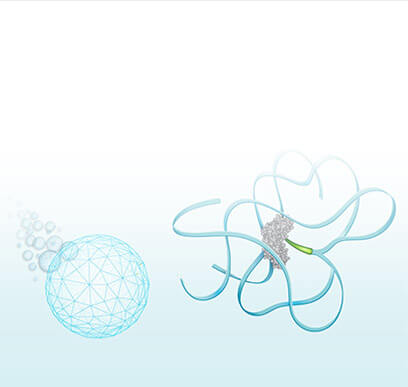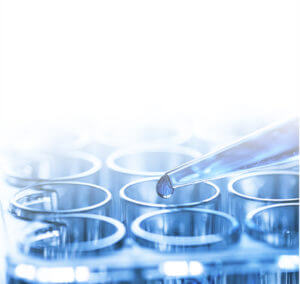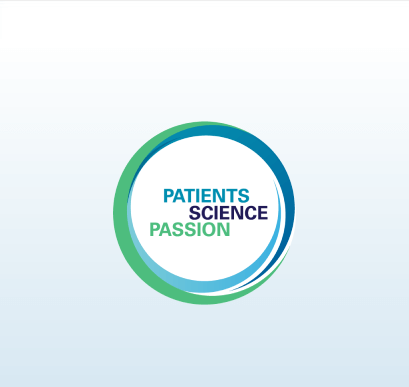TransCon hGH
An investigational GHD treatment designed to improve patients' lives
An investigational GHD treatment designed to improve patients' lives
Growth hormone plays an essential role in the health of children and adults, promoting normal growth in children and maintenance of normal body composition and cardiometabolic health throughout adulthood.
Pediatric GHD results from inadequate secretion of growth hormone from the anterior pituitary gland and is associated with short stature and delayed skeletal maturation.1,2 Pediatric GHD can be congenital or acquired, idiopathic or have a known cause, and can be isolated or occur with multiple pituitary hormone deficiencies.3 Daily somatropin has been the standard of care for decades, but registry data and surveys suggest that patients may have poor adherence, which is associated with suboptimal growth outcomes.4
In adults, growth hormone boosts protein production, promotes fat utilization, enhances muscle mass, and helps regulate blood sugar levels. Adult GHD is a rare disorder characterized by numerous metabolic abnormalities due to decreased or total loss of growth hormone production.5 Symptoms and morbidity can include central obesity, metabolic syndrome, decreased bone density, alterations in lipid profile and markers of cardiovascular risk, fatigue, general weakness, lack of muscle tone, and psychological symptoms such as cognitive impairment, social isolation, lack of motivation, and depression.6 Adult GHD is associated with economic burdens due to increased healthcare resource utilization, humanistic burdens due to loss of work productivity and unemployment, and the burden associated with comorbid conditions.7,8
Turner Syndrome
Turner syndrome is the most common congenital sex chromosomal condition in females and is associated with a range of physical features and clinical manifestations, including short stature and ovarian insufficiency.9-12 Clinical manifestations of Turner syndrome affect multiple organ systems and are associated with a range of severe and potentially life threatening complications, including cardiovascular disease, ovarian dysfunction, endocrine disease, renal malformation, liver disease, sensorineural hearing loss, and varied neuropsychological manifestations.9-11,13,14
TransCon hGH
Long-acting growth hormone (LAGH) formulations may represent an advance over daily somatropin because of greater convenience and unique pharmacodynamic properties, providing the potential for improved adherence and outcomes, according to the Growth Hormone Research Society.15
Approved for pediatric growth hormone deficiency, TransCon hGH is also being investigated in adult GHD and Turner syndrome.
- Grimberg A, DiVall SA, Polychronakos C, et al. Guidelines for growth hormone and insulin-like growth factor-1 treatment in children and adolescents: Growth hormone deficiency, idiopathic short stature, and primary insulin-like growth factor-I deficiency. Horm Res Paediatr. 2016;86(6):361-397. 25.
- Kang MJ, Kim EY, Shim YS, et al. Factors affecting bone age maturation during 3 years of growth hormone treatment in patients with idiopathic growth hormone deficiency and idiopathic short stature: Analysis of data from the LG growth study. Medicine (Baltimore). 2019;98(14):e14962. 2.
- Dattani MT, Brook CGD. Brook's Clinical Pediatric Endocrinology. 7th ed: Wiley-Blackwell; 2019.
- Cutfield WS, Derraik JG, Gunn AJ, et al. Non-compliance with growth hormone treatment in children is common and impairs linear growth. PLoS One. 2011(6);e16223.
- Feldt-Rasmussen U, Klose M. Adult Growth Hormone Deficiency- Clinical Management. In: Feingold KR, Anawalt B, Boyce A, et al., eds. Endotext. South Dartmouth (MA): MDText.com, Inc. Copyright © 2000-2023, MDText.com, Inc.; 2000.
- Thornton PS, Maniatis AK, Aghajanova E, et al. Weekly lonapegsomatropin in treatment-naïve children with growth hormone deficiency: The Phase 3 heiGHt Trial. J Clin Endocrinol Metab. 2021;106(11):3184-3195.
- Yuen KCJ, Biller BMK, Radovick S, et al. American Association of Clinical Endocrinologists and American College of Endocrinology Guidelines for management of growth hormone deficiency in adults and patients transitioning from pediatric to adult care. Endocr Pract. 2019;25(11):1191-1232.
- Stochholm K, Laursen T, Green A, et al. Morbidity and GH deficiency: a nationwide study. Eur J Endocrinol. 2008;158(4):447-457.
- Khan N, Farooqui A, Ishrat R. Turner Syndrome where are we? Orphanet J Rare Dis. Aug 28 2024;19(1):314.
- Aversa T, Li Pomi A, Pepe G, et al. Growth Hormone Treatment to Final Height in Turner Syndrome: Systematic Review. Clin Ther. Feb 2024; 46(2):146-153.
- Kesler SR. Turner syndrome. Child Adolesc Psychiatr Clin N Am. Jul 2007;16(3):709-722.
- Aly J, Kruszka P. Novel insights in Turner syndrome. Curr Opin Pediatr. Aug 1 022;34(4):447-460.
- Bondy CA, Turner Syndrome Study G. Care of girls and women with Turner syndrome: a guideline of the Turner Syndrome Study Group. J Clin Endocrinol Metab. Jan 2007;92(1):10-25.
- Huang AC, Olson SB, Maslen CL. A Review of Recent Developments in Turner Syndrome Research. JCardiovasc Dev Dis. Oct 23 2021;8(11).
- Christiansen JS, Backeljauw PF, Bidlingmaier M, et al. Growth Hormone Research Society perspective on the development of long-acting growth hormone preparations. Eur J Endocrinol. 2016;174(6):C1-8.





